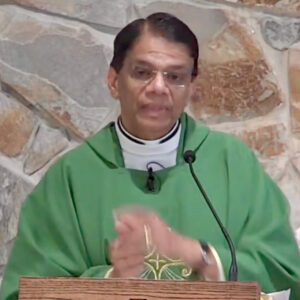Jesus chose the time of the Jewish Feast of Passover to fulfill what he had announced at Capernaum—giving his disciples his body and his blood as the true bread of heaven. When the Lord Jesus commands his disciples to eat his flesh and drink his blood, he invites us to take his life into the very center of our being. That life which he offers is the very life of God himself.
At the last supper when Jesus blessed the cup of wine, he gave it to his disciples saying, “Drink of it, all of you, for this is my blood of the covenant, poured out for many for the forgiveness of sins.” Jesus was pointing to the sacrifice he was about to make on the cross, when he would shed his blood for us—thus pouring himself out and giving himself to us—as an atoning sacrifice for our sins and the sins of the world. His death on the cross fulfilled the sacrifice of the paschal (Passover) lamb whose blood spared the Israelites from death in Egypt.
We often forget that receiving our Lord in the Blessed Sacrament is a privilege rather than a right. If it is a right, then God and the Church owe us a duty to dispense it to us without questioning our motives or disposition. But if it is a privilege, then the Eucharist is a pouring forth of God’s beneficent grace to the undeserving, a privilege which we should never take lightly. And this is why we pray this at every Mass before receiving Holy Communion: “Lord, I am not worthy to receive you under my roof, but only say the word and I shall be healed.” This sense of unworthiness is also reflected in one of the two prayers said by the priest quietly before he receives the body and blood of Christ: “May the receiving of your Body and Blood, Lord Jesus Christ, not bring me to judgment and condemnation, but through your loving mercy be for me protection in mind and body and a healing remedy.”
The Church has always understood that “in the most blessed sacrament of the Eucharist, the body and blood, together with the soul and divinity, of our Lord Jesus Christ, and, therefore, the whole Christ, is truly, really, and substantially contained,” says the Catechism of the Catholic Church.
She calls this presence “real” because “it is presence in the fullest sense; that is to say, it is a substantial presence by which Christ, God and man, makes himself wholly and entirely present.” It “begins at the moment of the consecration and endures as long as the Eucharistic species subsist.” Jesus declares Himself as the bread of life, offering eternal life through the consumption of His flesh and blood in the Holy Eucharist.
We shall receive Him with great love towards Him always with holiness and respect to Him.
Love and prayers,
Fr. Charley
